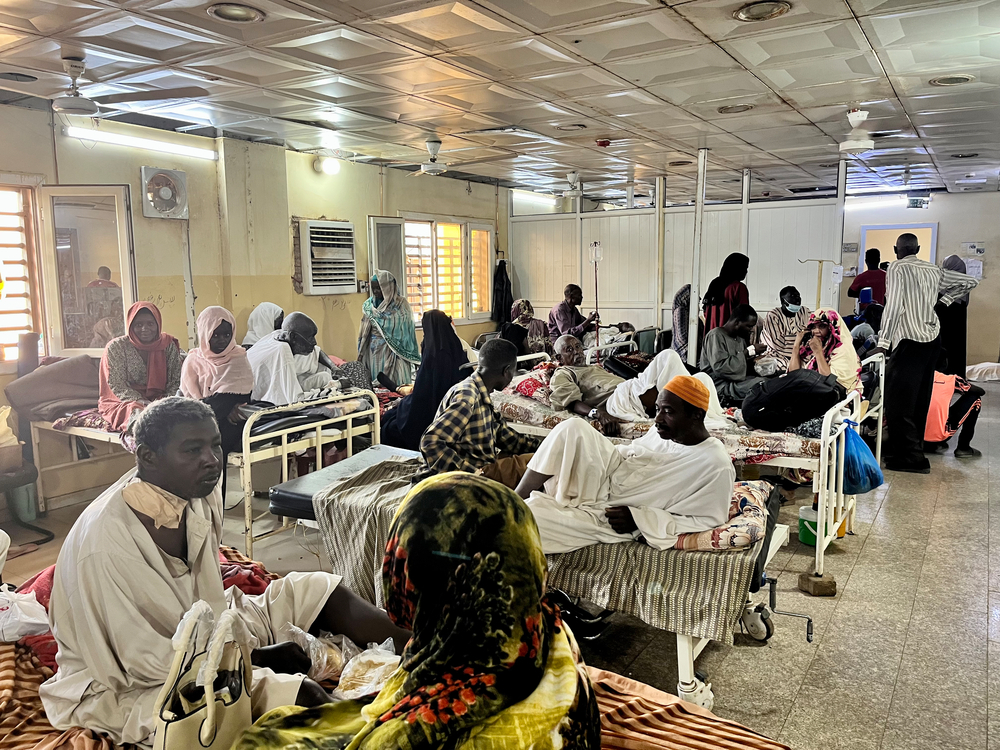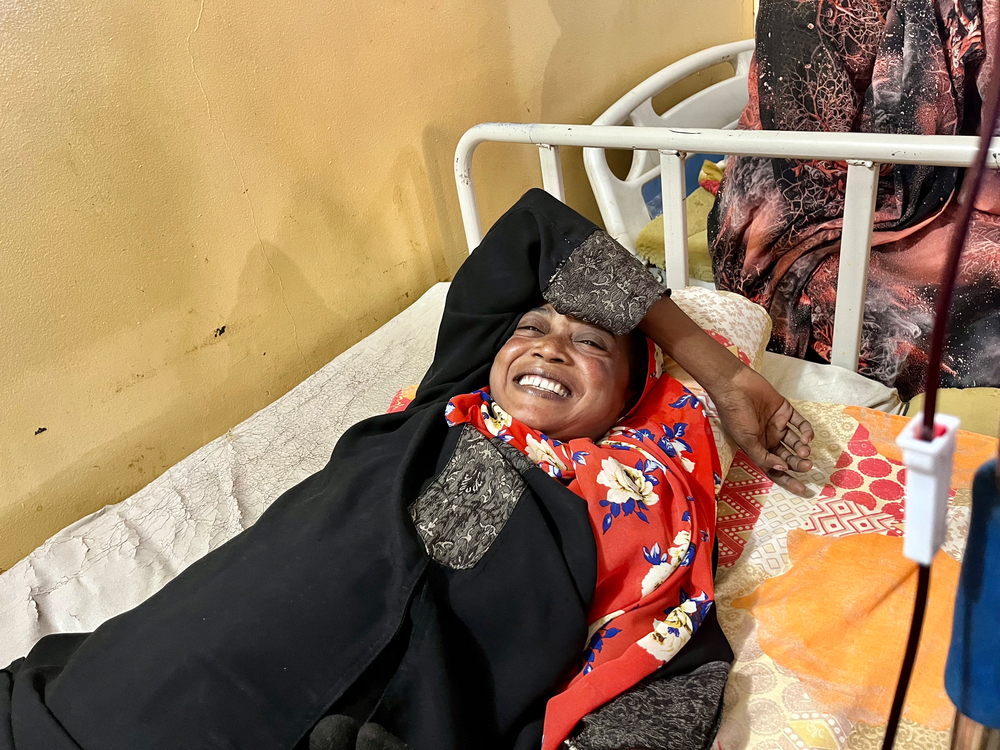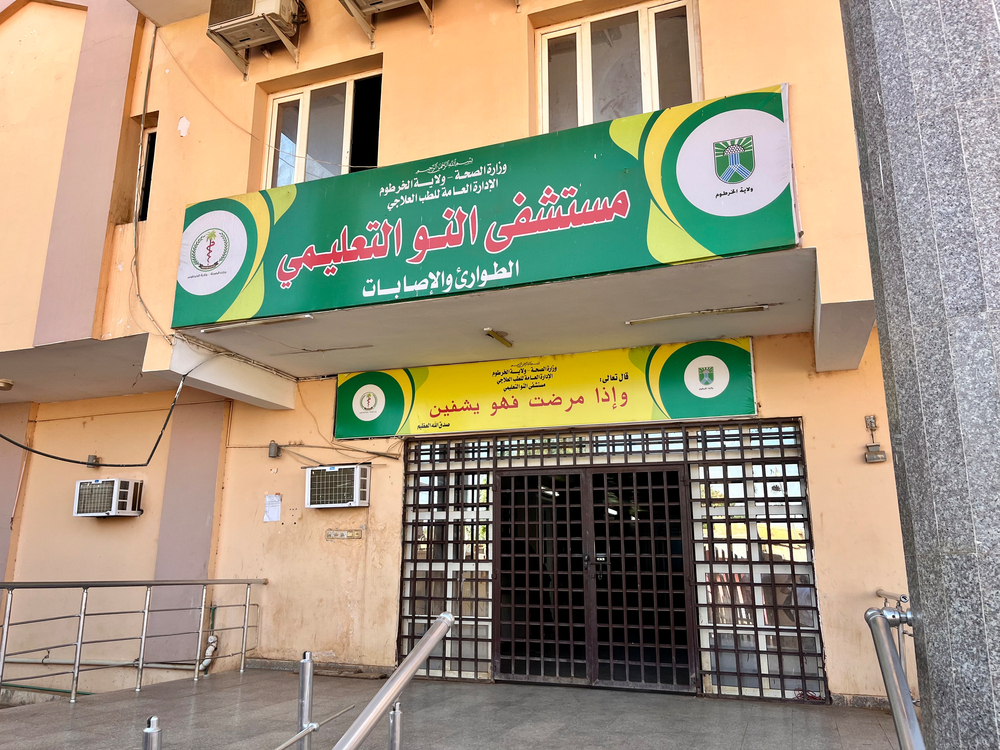Since the war in Sudan began in April 2023 and reached Khartoum state, Al-Nao hospital, located in Omdurman city, has become a humanitarian anchor for thousands of people. The hospital ran with minimal service at the beginning of the war, staffed by local health workers and volunteers. In July 2023, a team of dedicated doctors, nurses, logisticians, and volunteers got it running at capacity again. Since then, they have worked under extreme pressure, risking their lives daily to keep providing care.
“Before the hospital could treat anyone, we had to get the supplies in,” says a logistician for Médecins Sans Frontières (MSF), who was working at Al-Nao hospital in the beginning of the war. “Every shipment was a gamble. The warehouse was in Khartoum, around 30 kilometres away from Al-Nao hospital, and each route had to be scouted in advance for safety.”
“One volunteer from Al-Nao would drive towards us, scouting for clashes, while avoiding the shelling and the airstrikes,” says the logistician. “He guided us through side streets, sometimes under fire, just to make sure the medicines reached the hospital. Without him, and without those shipments, we wouldn’t have stood a chance.”

At the heart of a warzone
For two years, until the Sudanese Armed Forces (SAF) regained control of Khartoum in May 2025, intense fighting raged in Khartoum and Omdurman cities. This violence was and remains part of the wider civil war between the SAF and the Rapid Support Forces (RSF), which has devastated much of Sudan’s capital region. Fighting has ended in Khartoum now, but when the war began the capital and its sister cities across the Nile River, Omdurman and Bahri, were the sites of some of the fiercest fighting that Sudan has endured during this war.
MSF was forced to evacuate our teams out of Khartoum state at the beginning of the war, and only a few of our local MSF colleagues remained to continue providing and coordinating care while we planned for our full return once it was possible.
As frontlines closed in and neighbourhoods emptied, healthcare infrastructure crumbled. Hospitals were looted, shelled, or simply abandoned. Amid this devastation, teams of Sudanese healthcare staff and volunteers ensured Al-Nao hospital was able to provide care through its emergency roo
Al-Nao became a critical node in a collapsing health system. Its proximity to the frontlines made it both a target and a necessity. The Sudanese MSF staff who remained worked hand in hand with Ministry of Health employees and volunteers between May and July 2023 to restart the hospital’s full services.
The road from ruins to recovery
The team got to work, fixing up parts of the hospital that had been neglected. They swept and scrubbed floors, repaired broken windows, and restored power.
Al-Nao was only open four hours a day while it was being rehabilitated. In three months, because of Ministry of Health staff, volunteers, local MSF colleagues, and MSF’s financial support, the hospital was running 24/7.
The re-opening of this hospital marked a critical shift for people who had been affected by the war, as most health facilities in Sudan were either shut or barely functioning due to insecurity, looting, and shortages of supply. Health workers were barely making ends meet while putting their lives at risk. Hospitals were under immense pressure to remain functional in a war-torn economy, where essentials like fuel and basic medical supplies were both limited and overpriced.

A day like any other day
It was a day like many others for staff at Al-Nao. The shelling and bombing were persistent; so much so that people learned to recognise different projectiles based on their sound. The frontline in Omdurman, located in the Khartoum metropolitan area, where heavy fighting became a daily reality, was a mere two kilometres from the doorsteps of Al-Nao hospital. Outside, the city roared with chaos, but inside, the hospital moved with purpose.
MSF support from then to now
From 2023 to 2025, MSF’s support to Al-Nao hospital evolved from emergency rehabilitation to a comprehensive partnership with the gradual return of a full MSF project team. Today, we provide clinical training, essential medical supplies, fuel, water and sanitation services, and food for patients. We have also trained Ministry of Health staff on mass casualty response, and MSF provided financial incentives so they could continue to carry out critical, life-saving work in their community.
As the circumstances surrounding the hospital changed, so did the hospital’s role. Al-Nao’s service area expanded beyond Omdurman as frontlines shifted, to include parts of Bahri, and other districts of Khartoum state. With other hospitals damaged, destroyed or not yet functioning, Al-Nao became the only functioning emergency facility in Omdurman. Since July 2023, more than 48,000 trauma patients have been treated in the emergency room of Al-Nao hospital.
A hospital on the frontline
On 1 February 2025, an explosion struck a market in Omdurman. Within minutes, Al-Nao’s emergency room was overwhelmed.
The hospital teams treated 158 injured patients that day. Just three days later, another shell struck within 100 metres of the hospital, killing six people, including a local volunteer who had been providing meals through an initiative at the hospital. Al-Nao has been hit three times since the war began; in August 2023, October 2023 and June 2024. Yet, the staff kept going, no matter what.
Local efforts keep Al-Nao afloat
The strength of Al-Nao hospital lies in the unwavering dedication of its Sudanese staff. From both the Ministry of Health and MSF, it was Sudanese doctors, logisticians, nurses, and technicians who kept the hospital alive through bombardments, blackouts, and unbearable pressure.
Local initiatives were equally vital for the survival of the hospital. To this day, volunteers were everywhere and doing everything. Some had a pharmacy inside the hospital, which offered free-of-charge medicines to people who could not afford them, while others were helping in the emergency room during mass casualty events. Volunteers were also preparing food for patients and caretakers through community kitchens.
The unshaken sense of duty demonstrated by each staff member and volunteer is what kept Al-Nao hospital open when so many others had to close. Their courage made all the difference.
Holding the line
As frontlines kept shifting, waves of displaced people arrived in Omdurman, many of whom were returning to their neighbourhoods they had initially fled. This led to more people seeking care at Al-Nao, so it was essential to bring in more supplies.
MSF logistics teams worked tirelessly to ensure the hospital was stocked and operational.
“We had to transport the supplies in buses instead of trucks to avoid becoming a target,” says Omar Mhmed Elnour, MSF’s supply chain manager. “And the buses had to take the longest routes to avoid active battle zones. We even managed to send four fridges full of insulin in buses to address the shortage in the city to help save lives of diabetic patients.”
Despite these challenges, Al-Nao maintained operations. MSF support allowed the Ministry of Health to redirect its limited resources to other facilities, strengthening the healthcare system in Omdurman.
“Al Nao kept healthcare alive in western Khartoum despite enormous difficulties and harsh conditions,” says Dr Jamal Mohamed, the General Director of Al-Nao hospital.
The hospital’s ability to manage mass casualty events without compromising other healthcare services became a model of crisis resilience.
A model worth replicating
MSF’s approach towards Al-Nao hospital is based on strategic support that was designed to reinforce the efforts of Sudanese health workers and the Ministry of Health. Rather than leading operations, MSF focuses on supporting operations: providing essential supplies, financial incentives, technical guidance through local and international staff.
This model allowed the hospital to remain operational and responsive, even under extreme pressure and insecurity. This partnership has demonstrated that with the right kind of support, the local health system can continue to function, even in the middle of an active conflict.
One step forward, but the journey is not over

Al-Nao hospital has become an example of what is possible when dedicated humanitarians, whether from MSF, the Ministry of Health, or the local community, collaborate.
The story of Al-Nao is not over. The fighting in Khartoum may have ended, but the war continues, and people’s healthcare needs are growing. The hospital is resilient no doubt, but it cannot respond alone. Continuous support is needed to help Al-Nao and other healthcare facilities in Khartoum state and beyond.
Donors, policy makers, and humanitarian organisations can see Al-Nao as an example of how it is possible to rebuild the capacity of the health system in Sudan. The dedication of the Sudanese healthcare workers, volunteers, and people must be matched.












